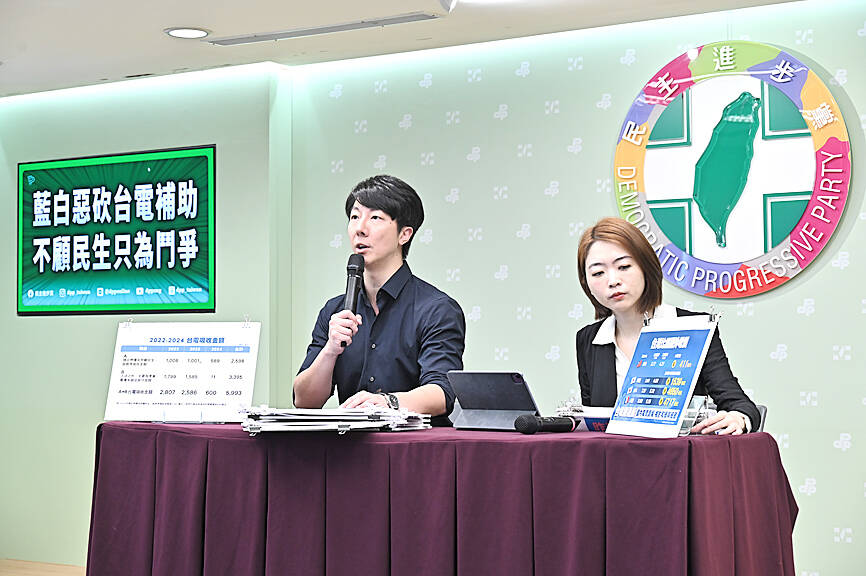Opposition parties are trying to force an electricity rate hike by cutting subsidies to Taiwan Power Co (Taipower) to cause public discontent against the Democratic Progressive Party (DPP) government, the DPP said yesterday.
Despite a recent report saying that Taipower has accumulated NT$422.9 billion (US$12.78 billion) deficit, Chinese Nationalist Party (KMT) and Taiwan People’s Party (TPP) legislators slashed NT$200 billion of subsidy support to the state-run company, DPP spokesman Justin Wu (吳崢) told a news conference at the party’s headquarters.
The two opposition parties claimed that Taipower’s massive deficit is caused by the DPP’s misguided national energy policy, and demanded the government extend the service life of nuclear power plants to avoid power outages, he said.

Photo: Tu Chien-jung, Taipei Times
“However, the main reason behind Taipower’s deficit is Russia’s invasion of Ukraine, which has caused prices of petroleum, gas, and fuel to surge globally. Taipower has accumulated a higher deficit, as it has been absorbing rising costs of energy sources worldwide,” he said. “The central government should provide subsidies for Taipower to make up for it.”
“However, the two opposition parties are making these malicious budget cuts to force Taipower to hike electricity rates so that the cost of living rises and there is public discontent,” he said. “Then the KMT and the TPP would take advantage [of the situation] and manipulate the public to attack the government.”
“The opposition parties ignore ordinary people’s hardships and want to increase living costs. They are also weakening Taipower’s financial health,” he said.
“Slashing government subsidies for Taipower would greatly reduce Taiwan’s ability for emergency response when there is a natural disaster,” Wu said. “Cutting Taipower’s subsidies would bring great harm to the nation.”
DPP spokeswoman Han Ying (韓瑩) said that while the KMT has called for extending the use of nuclear power plants due to their supposed lower cost, it misled the public by using inaccurate figures.
“The KMT promotes nuclear power taking a greater share in Taiwan’s energy mix, but it takes a very difference stance when facing voters,” Han said.
KMT Chairman Eric Chu (朱立倫) when serving as New Taipei City mayor said if Taiwan cannot handle nuclear waste properly, there is no reason to operate nuclear power plants, she said.
Chu vowed to not allow the Fourth Nuclear Power Plant in the city’s Gongliao District (貢寮) to operate and told voters that a “nuclear-free homeland is the common stance of all Taiwanese,” she said
“When serving as New Taipei City mayor, Chu even said he would not issue permits for nuclear waste storage sites... In the past he promised to stop operations of nuclear power plants, but now KMT members say an electricity shortage is caused by not extending the use of nuclear power plants,” she said.
“The KMT is being hypocritical, taking up contradictory stances to justify budget cuts, which is unfair, and detrimental to Taipower’s financial health,” she added.

“China is preparing to invade Taiwan,” Deputy Minister of Foreign Affairs Francois Wu (吳志中) said in an exclusive interview with British media channel Sky News for a special report titled, “Is Taiwan ready for a Chinese invasion?” the Ministry of Foreign Affairs said today in a statement. The 25-minute-long special report by Helen Ann-Smith released yesterday saw Sky News travel to Penghu, Taoyuan and Taipei to discuss the possibility of a Chinese invasion and how Taiwan is preparing for an attack. The film observed emergency response drills, interviewed baseball fans at the Taipei Dome on their views of US President

ECONOMIC BENEFITS: The imports from Belize would replace those from Honduras, whose shrimp exports have dropped 67 percent since cutting ties in 2023 Maintaining ties with Taiwan has economic benefits, Ministry of Foreign Affairs officials said yesterday, citing the approval of frozen whiteleg shrimp imports from Belize by the Food and Drug Administration (FDA) as an example. The FDA on Wednesday approved the tariff-free imports from Belize after the whiteleg shrimp passed the Systematic Inspection of Imported Food, which would continue to boost mutual trade, the ministry said. Taiwan’s annual consumption of whiteleg shrimps stands at 30,000 tonnes, far exceeding domestic production, the ministry said. Taiwan used to fill the gap by importing shrimps from Honduras, but purchases slumped after Tegucigalpa severed diplomatic ties with Taiwan

The Executive Yuan yesterday approved a southwestern extension of the Sanying MRT Line from New Taipei to Bade District (八德) in Taoyuan, with a goal of starting construction by late 2026. The 4.03-kilometer extension, featuring three new stations, will run from the current terminus at Yingtao Fude Station (LB12) in New Taipei City to Dannan Station (LB14), where it will connect with Taoyuan’s Green Line, New Taipei City Metro Corp said in a statement. This extension will follow the completion of core Sanying Line, a 14.29-kilometer medium-capacity system linking Tucheng (土城), Sansia (三峽)

CARGO LOSS: About 50 containers at the stern of the ‘Ever Lunar’ cargo ship went overboard, prompting the temporary closure of the port and disrupting operations Evergreen Marine Corp, Taiwan’s largest container shipper, yesterday said that all crew members aboard the Ever Lunar (長月) were safe after dozens of containers fell overboard off the coast of Peru the previous day. The incident occurred at 9:40am on Friday as the Ever Lunar was anchored and waiting to enter the Port of Callao when it suddenly experienced severe rolling, Evergreen said in a statement. The rolling, which caused the containers to fall, might have been caused by factors including a tsunami triggered by an earthquake in Russia, poor winter sea conditions in South America or a sudden influx of waves,